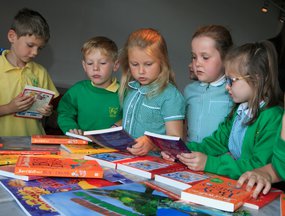
Growing up with books in the home is associated with a variety of benefits for learning and literacy (see e.g. Lindorff et al., 2023).
Along with tracking trends in levels of book ownership over time, our annual surveys of children and young people aged 5 to 18 consistently find links between book ownership and higher levels of reading enjoyment, frequency and skill (see, e.g. Picton & Clark, 2024).
In 2025, we asked 114,970 children and young people aged 5 to 18 whether or not they had a book of their own at home.
Key findings
- In 2025, 9 in 10 (89.7%) children and young people aged 5 to 18 said they had a book of their own at home, meaning 1 in 10 (10.3%) did not have their own book.
- Book ownership in 2025 was slightly higher among those aged 5 to 8 (92.2%) compared with those aged 8 to 18 (89.4%).
In the last year, book ownership trends have moved in different directions for different age groups:
- In 2025, book ownership was at the highest level for 5 to 8s since we first asked them this question in 2019 (92.2% vs 81.4% in 2019).
- By contrast, book ownership for children and young people aged 8 to 18 was at its lowest level in more than a decade (89.4% vs 90.4% in 2014).
Differences in book ownership by socioeconomic background, gender and geographical location
- In 2025, far fewer children and young people receiving free school meals (FSMs) said they had a book of their own compared with their peers who did not receive FSMs (84.3% vs. 91.0%). Around 1 in 6 (15.7%) of those receiving FSMs did not have a book of their own, compared with 1 in 11 (9.0%) of their non-FSM peers.
- The gap in book ownership by FSM status has increased from 4.4 percentage points to 6.7 percentage points since 2024, largely because more FSM pupils didn’t have a book of their own at home in 2025.
- By a small margin, this gap in book ownership by FSM status is the largest since 2014.
- More girls than boys aged 5 to 18 said that they had a book of their own at home (92.4% vs. 87.0%).
- Book ownership levels differed depending on where in the UK children and young people lived: around 9 in 10 children and young people in England (90.1%), Scotland (88.4%) and Northern Ireland (88.2%) said they had a book of their own at home. This decreased to 4 in 5 (82.2%) in Wales.
- There were also some differences in book ownership by English region: the highest percentages of book ownership were reported in London (93.5%) and the South West (91.6%), while the lowest were found in Yorkshire and the Humber (85.3%) and the North West (86.7%).
Why does book ownership matter?
Having a book was strongly associated with enjoyment of reading, reading frequency and self-perception of reading ability:
- In 2025, nearly four times as many children and young people with a book of their own at home said they enjoyed reading compared with those without their own book (40.0% vs 11.3%).
- Similarly, nearly four times as many book owners reported reading daily compared with their peers who did not have a book (24.1% vs 6.8%).
- More children and young people who had a book of their own considered themselves to be ‘very good’ or ‘good’ readers compared with those who didn’t have their own books (79.2% vs. 53.1%).
These findings emphasise the value of book ownership for reading engagement and the need to ensure that all children and young people, including those from lower-income backgrounds, have access to the reading resources linked with improved literacy and life outcomes.